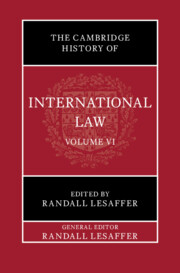Book contents
- The Cambridge History of International Law
- The Cambridge History of International Law
- Frontispiece
- The Cambridge History of International Law
- Copyright page
- Contents
- Plates
- Contributors
- Preface
- Abbreviations
- Part I International Law in Renaissance Europe (1492–1660)
- Part II International Law in Old Regime Europe (1660–1775)
- 12 The Law of Nations in Old Regime Europe
- 13 Territory and Jurisdiction in Old Regime Europe
- 14 The Law of the Sea in Old Regime Europe
- 15 War and the Use of Force in Old Regime Europe
- 16 Warfare on land in Old Regime Europe
- 17 Maritime Warfare in Old Regime Europe
- 18 Peacemaking in Old Regime Europe
- 19 Trade in Old Regime Europe
- 20 Diplomacy in Old Regime Europe
- 21 Dispute Settlement in Old Regime Europe
- 22 The Ottoman Encounter and the Law of Nations in the Old Regime
- Index
- Plate Section (PDF Only)
- References
14 - The Law of the Sea in Old Regime Europe
from Part II - International Law in Old Regime Europe (1660–1775)
Published online by Cambridge University Press: 22 April 2025
- The Cambridge History of International Law
- The Cambridge History of International Law
- Frontispiece
- The Cambridge History of International Law
- Copyright page
- Contents
- Plates
- Contributors
- Preface
- Abbreviations
- Part I International Law in Renaissance Europe (1492–1660)
- Part II International Law in Old Regime Europe (1660–1775)
- 12 The Law of Nations in Old Regime Europe
- 13 Territory and Jurisdiction in Old Regime Europe
- 14 The Law of the Sea in Old Regime Europe
- 15 War and the Use of Force in Old Regime Europe
- 16 Warfare on land in Old Regime Europe
- 17 Maritime Warfare in Old Regime Europe
- 18 Peacemaking in Old Regime Europe
- 19 Trade in Old Regime Europe
- 20 Diplomacy in Old Regime Europe
- 21 Dispute Settlement in Old Regime Europe
- 22 The Ottoman Encounter and the Law of Nations in the Old Regime
- Index
- Plate Section (PDF Only)
- References
Summary
The present chapter addresses the creation process of the fundamental dichotomic system of the modern law of the sea, viz. territorial sea and high seas, in Old Regime Europe thorough the analyses of ‘state practices’ and doctrines regarding dominium maris, based on some preceding historical backgrounds. It also discusses two neglected issues in order to grasp the accurate, at least theoretically, traces in establishing the current perception of ‘territorial sea’ emanating from the ‘cannon-shot rule’, most famously propounded by Bynkershoek for defining the outer limit of the adjacent sea. The discussion concludes that, although the basic notion of the modern dichotomic system had generally been recognised during the epoch surveyed, no unified criterion for determining the extent of the terrestrial authority over the sea had emerged. It suggests, in the end, the importance of two Italians, Galiani and Azuni, as the earliest known theorists who proposed the theoretical equation of the rules of cannon-shot and three-mile limit and indicates the necessity of fathoming the complex spoors of the history of the law of the sea originating from immensely diverse theories and practices.
- Type
- Chapter
- Information
- The Cambridge History of International Law , pp. 466 - 494Publisher: Cambridge University PressPrint publication year: 2025

